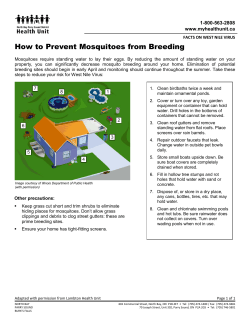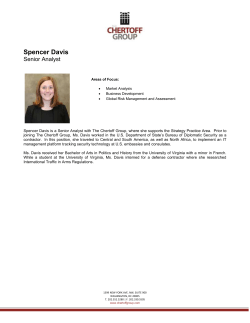
May 2015 newsletter - Plant Breeding Center
the PLANT BREEDING CENTER UNIVERSITY OF CALIFORNIA, DAVIS GRADUATE STUDENT SPOTLIGHT JORGE BERNY My name is Jorge Carlos Berny Mier y Teran, A.K.A. Jorge Berny. I’m a 4th year Ph.D. student in the Horticulture and Agronomy Graduate Group working in Dr. Paul Gepts’ lab. I’m from Yucatan, Mexico, where I studied Agronomy Engineering and focused on genetic resources of hot peppers for my thesis with Dr. Luis Latournerie at the Instituto Tecnologico Agropecuario. While doing my undergraduate studies, and farming vegetables on the side, I recognized the importance of plant breeding by observing differences in productivity and quality among cultivars grown under the same management and inputs. I thought, if I want to be the best farmer I should start with the best varieties. Generally, there is little improvement for minor crops or local market classes, especially in tropical environments; I thought I had to do it myself. As I got more interested in breeding, I realized that it was a big enough job by itself and that I had to put my farmer dreams on hold. I decided to pursue my Master’s at the Hebrew University of Jerusalem, investigating the inheritance of postharvest water loss in peppers. I had the opportunity to learn practical breeding with Dr. Yoni Elkind, molecular tools with Dr. Ilan Paran, and postharvest physiology with Dr. Eli Fallik. Before starting my Ph.D. at UC Davis I worked at Instituto Nacional de Investigaciones Forestales, Agricolas y Pecuarias (INIFAP) in Yucatan doing research on and breeding peppers and beans. Specifically, I worked on developing inbred and hybrid cultivars of habanero peppers, and collecting and evaluating landraces of cowpeas, common beans, and lima beans of Southeast Mexico for productivity under drought. The nutritional, agronomic and economic importance of beans in Mexico and elsewhere, as well as the highly detrimental effect of drought on yield led me join the Gepts Lab at UC Davis. Dr. Gepts is one of the leaders in genetic resources and genomic tools in beans. May 2015 Although breeding efforts to increase drought tolerance have shown some gain, improvements have been limited by the complexity of the mechanisms involved, the limited germplasm recombination, and most importantly, its poorly understood genetic basis. For my thesis work, I’m focusing on the genetics and physiology of drought adaptation in common bean, and exploring the genetic diversity of wild and domesticated Mesoamerican beans. In particular, my research has been focused in: 1) QTL analysis of yield and yield components affected by drought in domesticated bean; 2) a genome-wide association study and evaluation of wild accessions from the Mesoamerican gene pool for root morphology and water use efficiency in drought and control conditions in a controlled environment, with the collaboration of Eneas Konzen and Viviana Medina; 3) introgression of the genetic diversity of wild beans and joint QTL analysis using nested backcross recombinant inbred populations I developed using wild accessions backcrossed to an elite breeding line. I have worked in collaboration with Dr. Matthew Gilbert on investigating breeding lines, a bi-parental population developed at CIAT, as well as a multi-parent population I´ve developed. The results of my research will be applied in conventional and marker assisted breeding, as well as for future fine mapping of the genes underlying drought resistance. One of the factors that made me choose UC Davis, besides being the very best in agricultural education and research in the world (Go Aggies!), is Dr. Paul Gepts’ bean breeding program, which has given me the opportunity for hands-on experience in field breeding of such an important and tasty field crop. Also, to not lose contact with vegetables, I helped start a small student-run program at the Student Farm to breed peppers for organic systems. To develop as a breeder, I think there is no substitute to spending a quantity of quality time in the real world of the experimental and farmers’ fields to learn the cropping system, observe the variation and possibilities with crops, and to develop research ideas. Studying at UC Davis has allowed me to do these things. I´ll take advantage of my 700 words of fame to acknowledge my previous and current mentors, and to thank Paul for his guidance, patience and support. I’d also like to thank Antonia Palkovic, Laura Gamiño, Sarah Dohle, the rest of the Gepts lab, and the field, greenhouse, and administrative staff for all their help and assistance. -Jorge Berny plantbreeding.ucdavis.edu UC DAVIS NEWS OPPORTUNITIES AND EVENTS UC DAVIS TOPS WORLD RANKINGS IN AGRICULTURE, VETERINARY SCIENCES THE SACRAMENTO BEE THIRD THURSDAY 4:00-5:30PM, MAY 21ST, 2015 FOUNDATION PLANT SERVICES @ UC DAVIS 455 HOPKINS ROAD UC Davis is ranked No. 1 in the world for teaching and research in agriculture and forestry, as well as veterinary sciences, according to data released Tuesday by QS World University Rankings. This month, we will be visiting the UC Davis Foundation Plant Services. FPS is a self-supporting service department in the College of Agricultural & Environmental Sciences at the University of California, Davis which produces, tests, maintains and distributes premium foundation-level virus & disease-tested plant materials for use by California nurseries. Register for vanpool here. This is the third consecutive year that UC Davis has been ranked first in agriculture and forestry by QS, according to a UCD news release. >>>read more CAN THIS SCIENTIST UNITE GENETIC ENGINEERS AND ORGANIC FARMERS? NATIONAL GEOGRAPHIC PLANT BREEDING FOR FOOD SECURITY: THE GLOBAL IMPACT OF PLANT GENETICS IN RICE PRODUCTION THURSDAY, MAY 28TH, 2015 CONFERENCE CENTER @ UC DAVIS The Plant Breeding Center, and the Confucius Institute of UC Davis are pleased to announce the Khush Symposium: “Plant Breeding for Food Security: The Global Impact of Plant Genetics in Rice Production,” a symposium honoring Dr. Gurdev Khush. Register here. DAVIS, California— Eighteen scientists are sitting in a lab, talking about new ways to feed the planet. These are some of the world’s foremost experts on rice. Most of them are from China. Nearly all of them are men. But it’s an American woman—tan and fit at 54, with gray-brown hair and bright green eyes—who clearly runs the show. Her name is Pamela Ronald, and this is, after all, her laboratory. NATIONAL ASSOCIATION OF PLANT BREEDERS ANNUAL MEETING JULY 27-30, 2015 PULLMAN, WA >>>read more The 2015 NAPB/PBCC conference will feature sessions focusing on “Exploiting genetic resources in public and private breeding programs,” “Plant breeding organization, policy, and funding,” and workshops on “Breeding for consumer product quality: successes and failures,” and “Diverse skills needed for a diverse plant breeding workforce.” Graduate student mini-presentations, abstract competition winner presentations and poster sessions will be a major feature of the program as in previous years. USING CROP GENETIC RESOURCES TO HELP AGRICULTURE ADAPT TO CLIMATE CHANGE: ECONOMICS AND POLICY USDA Inspired by the donation of an alum, The Plant Breeding Center is pleased to announce a limited number of $500 travel scholarships for graduate students to attend the NAPB Annual Meeting. Students must present a poster at the meeting and submit their accepted abstract. To apply for funds, click here. RELATED NEWS Climate change poses likely risks to future crop productivity as temperatures rise, rainfall patterns become more variable, and heat waves, drought, pests, and diseases increase. One strategy for helping farmers adapt to these changes is the development of crop varieties with better tolerance for increased stresses. Traits to boost crop adaptation, which may be found in genetic resources such as landraces (local varieties developed by farmers over many years) or in wild relatives of domestic crops, may be incorporated into varieties that gain wide commercial production. >>>read more STUDENT LUNCH: HANS-JOACHIM BRAUN, DIRECTOR OF CIMMYT’S GLOBAL WHEAT PROGRAM MAY 21ST, 1-2PM ASMUNDON 242 On May 20th, Hans-Joachim Braun will be leading a Plant Sciences seminar titled: “CIMMYT Global Wheat Breeding Program Impact and Challenges.” On May 21st the PBC will be hosting a student lunch to meet and talk with Dr. Braun. To register for the student lunch, click here. Program Representative Amanda Pietras - ampietras@ucdavis.edu Director Charlie Brummer - ecbrummer@ucdavis.edu Associate Director Allen Van Deynze - avandeynze@ucdavis.edu plantbreeding.ucdavis.edu
© Copyright 2025









